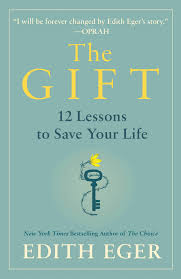
The Gift: 12 Lessons to Save Your Life by Dr. Edith Eger, Psychologist
Here I sit, on a cold, snowy February day, at my computer with that cold, flaky white stuff drifting down from that cold, gray sky. I’ve become a frenzied knitter, this winter of our COVID-19 discontent, clicking my bamboo knitting needles in endless colors weaving endless skeins of yarn into more afghans than my children or grandchildren (especially those in the hot Scottsdale climate) will ever need or use. I’ve also continued my lifelong habit of reading- from “Fifty Famous Fairy Tales” when I was little (how convenient it was to read ‘once upon a time’ conclude with ‘happily ever after’!) to tales of fiction, non-fiction, and self-help as I’ve grown older. Which brings me to The Gift by Dr. Edith Eger- a wonderful, enriching book conceived as a “practical guide to help us identify our mental prisons and develop the tools we need to become free.”
“One cold dawn day in April…Magda and my parents and I were loaded into a cattle car bound for Auschwitz. My parents were murdered in the gas chambers the day we arrived.” Edith Eger’s “once upon a time” began at Auschwitz, with all the ensuing horrors and loss. Upon liberation, she married, immigrated to America, “lived on pennies, rose out of poverty, and, in my forties, went to college,” eventually earning a doctorate in clinical psychology. As she writes in her introduction, “Auschwitz provided the opportunity to discover my inner strength and my power of choice…It’s not what happens to us that matters most, it’s what we do with our experiences.” And so begins this remarkable guide into self-help and away from self-victimization.
While treating a woman experiencing marital difficulties, Eger counseled, “Honey, you’re in charge, so take charge. Don’t be Cinderella, sitting in the kitchen waiting …you have all the love and power you need within.” I loved the Cinderella story, with pumpkin coaches and that proverbial happy ending, but life is not a fairy tale and Eger’s advice is reality: don’t succumb to victimhood, don’t let others define you (whether your spouse or your employer or your friends), “it’s not who you are- it’s what was done to you.” Eger has advice for parents and for husbands and wives, for family members and friends who harm us and those who love us. She writes that we should change the don’ts: “No more don’t, don’t, don’t…I do have a choice. I do have a life to live. I do have a role.” And, using that maternal tone I so enjoyed reading, she advises, “Honey, find you and keep filling it up with more you. You don’t have to work to be loved. You just have to be you. May you be more and more you every day.”
To arrive at the aforementioned “you,” Eger concludes each chapter with “Keys To Free Yourself From…” fill in the blank- Unresolved Grief, Secrets, Resentment, Paralyzing Fear- any and all topics addressed in her stories. I admit I was reluctant at first to read another book which referenced the Holocaust; I am looking for joy in the present and hope for the future- frantically knitting my afghans, reading beach-worthy fiction, and baking chocolate chip cookies (and licking the batter, she confesses) have sustained me. But so has Edith Eger, to my surprise. Toward the end of the book she writes of her Aunt Matilda, “who lived to be one hundred, [who] woke up every morning and said, ‘It could be worse, and it could be better.’” Those are also the sentiments of my dear mother-in-law, who at 101 professes, “this too shall pass.” I now look forward to snow-shoeing in the ever-present snow falling outside my window, visiting my grandchildren sooner rather than later in that hot Scottsdale climate, and being more “me” every day. If Edith Eger can choose a glass half-full of hope, resilience and positive choices, so can we…wrapped up in soft, wooly afghans with a cookie jar full of chocolate chip cookies!
Randy Rubinstein lives in Sharon, Massachusetts
